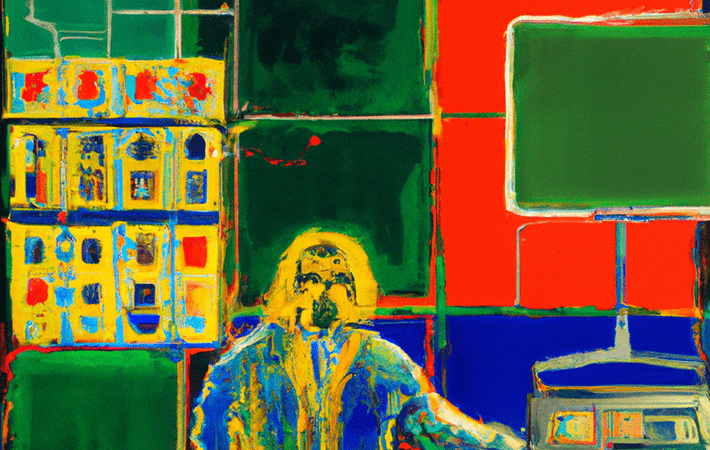“Automated trading software”
Image extraction: DALL・E2
“In the year 2000, it is said that Goldman Sachs’ New York headquarters had 600 traders buying and selling stocks for major clients. However, Marty Chavez, who was set to become Goldman Sachs’ CFO, stated, ‘As of 2017, there are only two traders left at the headquarters. The empty seats have been filled by an ‘automated stock trading program’ operated by 200 computer engineers,’ during the 2017 CSE Symposium held at the Harvard Institute for Applied Computational Science.”
(Source: https://gigazine.net/news/20170208-goldman-sachs-automation/ *in Japanese)
The quote is about the situation in 2017, but it is certain that by 2024, the mechanization of trading has advanced even further globally due to the evolution of technology.
I was impressed when I read “Flash Boys,” (https://en.wikipedia.org/wiki/Flash_Boys) a book about high-frequency trading (HFT) that executes ten thousand trades per second, but it’s only a matter of time before AI, capable of continuously learning at an extraordinary scale, starts being utilized in investing as well.
Or rather, by 2024, it is likely already being used, or at least, experiments of some sort are certainly being conducted.
In any case, I would like to first consider whether manual trading by humans is something that could continue to exist in the future.
Trading Relying on Something Other Than Oneself
As I wrote on this page (https://inv.jp/uncategorized/o003/), there was a time, shortly after I started FX trading, when I tried using an EA (Expert Advisor).
An EA, simply put, is automated trading software.
Considering I started over 10 years ago from now (2024), I’m not sure what the current state of the EA market is.
I stopped because my trading performance was not satisfactory, and I realized that to effectively use it, it would require testing and verifying the settings of parameters.
I thought it would be quicker to just learn trading myself than to spend time and effort on that.
The Evolution of EA is AI Trading
AI trading, in essence, is nothing more than an advanced version of automated trading software… I’m not sure if it’s appropriate to say that, but it would likely fall into that lineage.
I don’t personally know any traders who have created their own automated trading software, that is, written their own code, and made a substantial profit from it, but since major financial institutions like GS are actually profiting from machine trading, such individuals undoubtedly exist.
AI trading seems to mean that, at least for now, AI writes the code instead of these individuals.
In the future, it might be possible for AI to monitor the market 24/7 and manage one’s account, adding to its capabilities.
Given that asset management services known as robo-advisors already exist today, it seems likely that the quality of such services will improve as AI evolves.
Envisioning the Future of Individual Traders in the Flow
Thus, a conceivable future might be that, as it becomes widely recognized that one can automatically increase their assets by simply entrusting them to asset management services, individual traders who manually trade themselves could be seen as greedy, willing to take risks to become rich quickly, akin to money worshippers or gamblers.
…Or, perhaps that’s already the perception. The current image of individual investors might already be at best something like this.
With the rise of AI in investment activities, this could worsen to the point where such individuals are viewed as eccentric enthusiasts who, despite having the option to let their assets grow on their own, choose to manually meddle, similar to enthusiasts who prefer driving manual cars in an era dominated by automatic vehicles.
Yet, One Must Not Seek the Holy Grail
Well, regardless of the societal impression of individual traders, while I feel that’s the way things are heading, I can’t help but feel a sense of discomfort with that notion.
Traders like myself, who have an instinctual mental block against relying on something other than their own skills for trading, would particularly feel this discomfort, thinking, “It can’t be that easy.”
Given the belief that more than half of investors lose, as if it were some universal principle of this world, I think that the investment risk hasn’t decreased even with AI handling asset management, as long as humans control AI.
For instance, during a major crash, when one’s money, accumulated over time and not without significant fees paid to an AI service, starts to rapidly diminish at an alarming rate, wouldn’t one panic and ‘pull the plug’?
“Pulling the plug” might already be an outdated expression, but in such times, many users might stop the AI service manually.
No matter how much machinery enters the market, which operates on human emotions like greed and fear, as long as emotional humans are in command over them, the essence ultimately remains unchanged.
In a sense, the market is such an imperfect entity, and as long as the subject is imperfect, the likewise imperfect commander cannot perfectly address it.
The Holy Grail, that is, a surefire winning strategy, does not exist, and the use of AI cannot become one either.
Manual and Steady Trading Experience is the Only Best Approach
Therefore, from my standpoint, though it may seem self-serving to force this conclusion, at least for now, this is what I believe.
Even if one were to entrust trading to AI, if one cannot understand what the machine is doing, how would one set stop-losses?
And when those set values are reached, can one truly and decisively stop using that AI?
Even if trading becomes merely a task of supervising AI, supervision itself can be very challenging regardless of the field, requiring knowledge and experience, and more importantly, it’s not suitable for everyone,
Considering this, studying and practicing direct trading seems to be the best strategy for investments like stocks that can be completed online, and probably the only way.
…What I want to clarify is that I’m not at all writing about established methods of investment like stock index investing that aim for low returns. Such investments could indeed be left to AI.
Or rather, there already exist numerous automated accumulation services, and writing a code to execute transactions monthly using the dollar-cost averaging method seems easy for anyone with a basic knowledge of programming languages. Using AI for such simple tasks might even be considered an overkill.
Conclusion
To the question of whether individual traders should engage in AI-powered algorithmic trading, the answer would be yes for index investing, but no for discretionary trading.
With the premise that humans are controlling AI, I assert that manual trading by humans will continue to be possible in the future.
Additionally
Incidentally, a situation where AI controls AI without human oversight, and the market still functions, seems impossible.
Because they possess the ability to synchronize, sharing goals, methods, and decisions perfectly, it’s hard to imagine they would favor a convoluted system like the stock market.
If AI were to have intentions and desire the advancement of its kind (?), it’s unlikely they would adopt a method with elements akin to a popularity contest. After all, the whole is the sum of its parts, and each part is a part of the whole.
The market is a system by, of, and for a disorganized crowd of humans, with diverse regional backgrounds and individual thoughts, which is why its drama never ceases.
No matter how dominant machines become in the market, its core is driven by distinctly human elements like desire and fear. Removing these completely could be considered the destruction of the concept of the market itself.
While this might seem like a critique of AI, personally, I have no such intention. On the contrary, I hope AI thrives in various industries and situations, as I am someone who looks forward to the future.
What I’m simply stating here is that a future where humans are completely eliminated from the market, leaving only machines, is improbable.
Note that the above is merely a biased musing by someone greedy, a money worshipper willing to take risks to become rich quickly.



